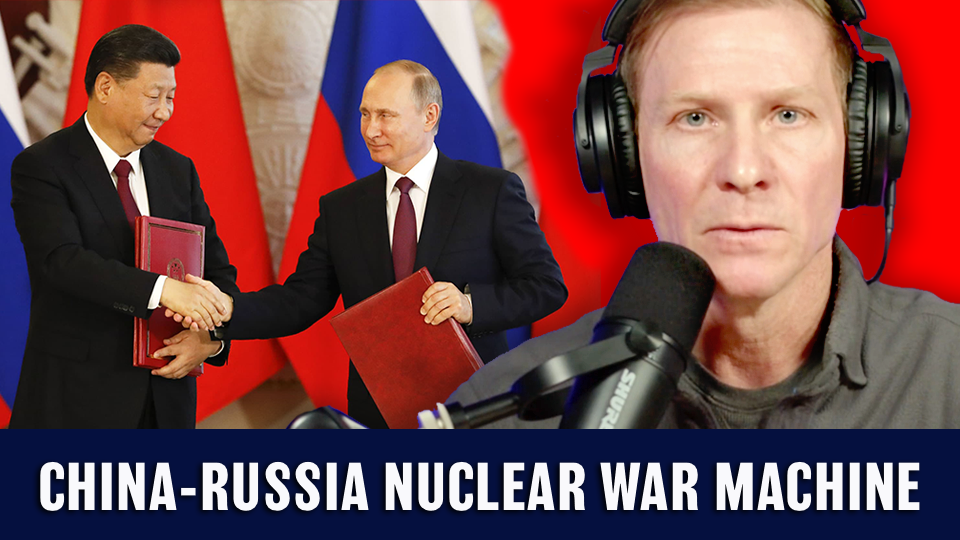RED DAWN ALERT! China-Russia Nuclear War Machine Getting Stronger

While the two countries have had a history of tensions and rivalry, they have also formed a strategic partnership in recent years, with increasing military, economic, and political cooperation. The partnership between Russia and China has been driven by a shared interest in countering US influence and promoting multipolarity in the international system. Both countries have faced increasing pressure from the United States, which has imposed economic sanctions and pursued a policy of containment against both countries. Russia and China have responded by deepening their economic ties, with China becoming Russia's largest trading partner and a major investor in the country. The two countries have also conducted joint military exercises and signed a number of agreements on defense cooperation. In 2018, Russia and China held their first joint naval exercises in the Baltic Sea, and they have since conducted joint military exercises in other regions, including the Arctic and the Asia-Pacific. They have also signed a number of agreements on military and defense cooperation, including joint development of military technologies and the sharing of intelligence. China and Russia both possess significant nuclear capabilities, and are considered to be two of the world's major nuclear powers. Russia has the world's largest nuclear arsenal, with an estimated 6,255 nuclear warheads as of 2021, according to the Stockholm International Peace Research Institute (SIPRI). Russia's nuclear capabilities include intercontinental ballistic missiles (ICBMs), submarine-launched ballistic missiles (SLBMs), and strategic bombers. Russia is also developing new nuclear weapons, such as hypersonic missiles and underwater drones. China has a smaller nuclear arsenal than Russia, with an estimated 350 nuclear warheads as of 2021, according to SIPRI. However, China is modernizing its nuclear forces, and is developing new nuclear weapons and delivery systems, such as hypersonic glide vehicles and multiple independently targetable reentry vehicles (MIRVs). China's nuclear capabilities include ICBMs, SLBMs, and intermediate-range ballistic missiles. Both China and Russia are also signatories to the Treaty on the Non-Proliferation of Nuclear Weapons (NPT), which aims to prevent the spread of nuclear weapons and promote disarmament. However, both countries have expressed concern about the nuclear arsenals of other countries, such as the United States, and have criticized the US for developing new nuclear weapons and modernizing its nuclear arsenal. Russia is a major oil and gas producer and a key supplier of fuel to China. The two countries have developed an extensive network of energy infrastructure to support this trade, including pipelines and ports. In addition, Chinese companies have invested in Russia's energy sector, with a particular focus on natural gas.
Sources: https://www.cbsnews.com/news/antony-blinken-china-russia-lethal-support-ukraine-face-the-nation/ https://www.cbsnews.com/news/russia-china-lavrov-visit-beijing-vladimir-putin-xi-jinping-new-world-order/ https://www.telegraph.co.uk/news/2023/02/20/china-may-win-putins-war-ukraine/ https://www.theguardian.com/world/2022/feb/04/xi-jinping-meets-vladimir-putin-china-russia-tensions-grow-west https://www.bbc.com/news/60571253 https://www.bbc.com/news/world-asia-india-60783874 https://worldpopulationreview.com/country-rankings/military-size-by-country https://www.welt.de/politik/ausland/plus243859529/Wolodymyr-Selenskyj-Falls-sich-China-mit-Russland-verbuendet-gibt-es-einen-Weltkrieg.html @FoxNews @CNN @DeptofDefense @ABCNews @news @CBSNews @NBCNews @WhiteHouse @NewsmaxTV @oann #news #breakingnews #foxnews #cnn
Check out our latest articles
Zero risk. Only gains.
100% Risk Free
Your complete satisfaction guaranteed or your money back.
Made by Real People
Made and packaged in our facility right here in the USA. Any issues, just give us a call.
Free Shipping
Free shipping on orders $69.99+. Always out the door in a day or two straight to your home.
For more information, please visit our Terms of Service. Learn More
Zero risk. Only gains.
100% Risk Free
Your complete satisfaction guaranteed or your money back.
Made by Real People
Made and packaged in our facility right here in the USA. Any issues, just give us a call.
Free Shipping
Free shipping on orders $69.99+. Always out the door in a day or two straight to your home.
For more information, please visit our Terms of Service. Learn More










